(人教版2019)高考英语 一轮复习夯实基础必背知识清单 专题05. 选择性必修第3册 Unit 5 Poems
文档属性
| 名称 | (人教版2019)高考英语 一轮复习夯实基础必背知识清单 专题05. 选择性必修第3册 Unit 5 Poems |
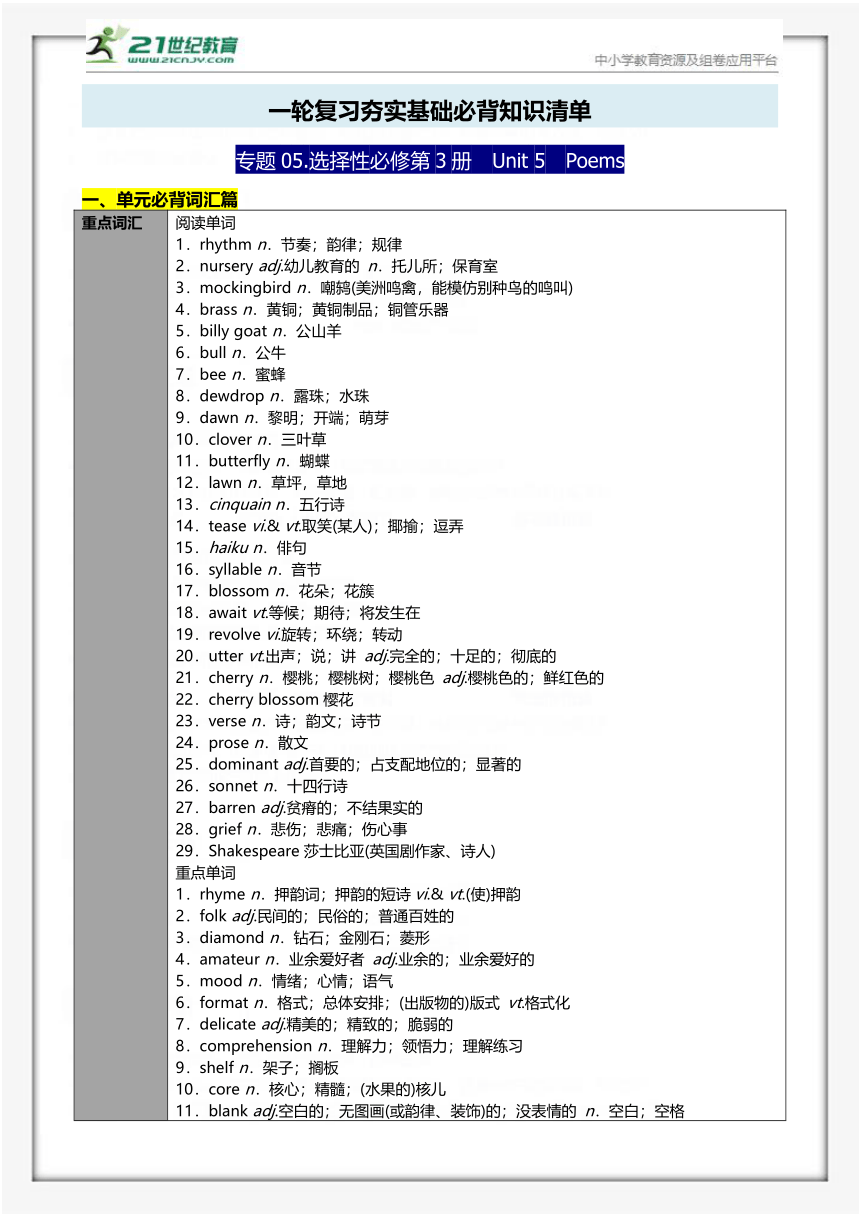
|
|
| 格式 | docx | ||
| 文件大小 | 110.8KB | ||
| 资源类型 | 试卷 | ||
| 版本资源 | 人教版(2019) | ||
| 科目 | 英语 | ||
| 更新时间 | 2022-11-18 00:00:00 | ||
图片预览

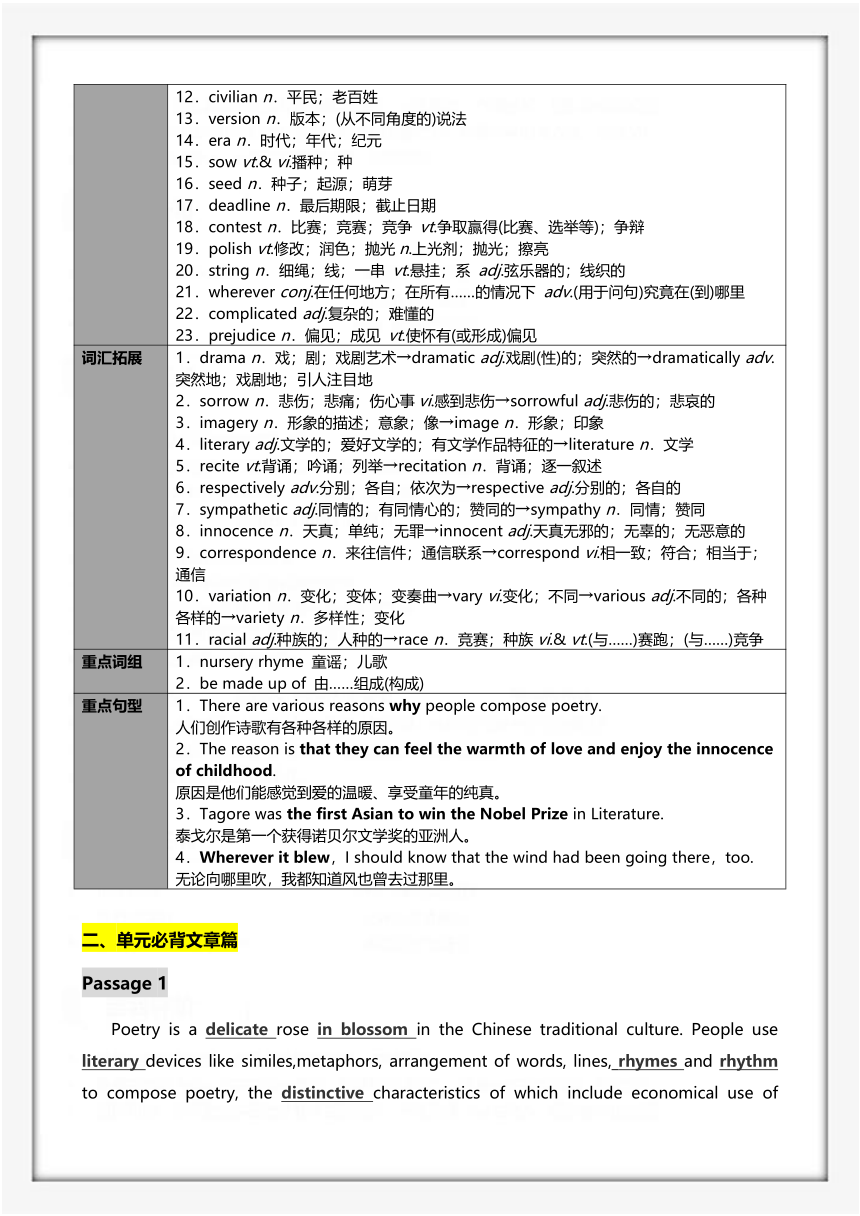
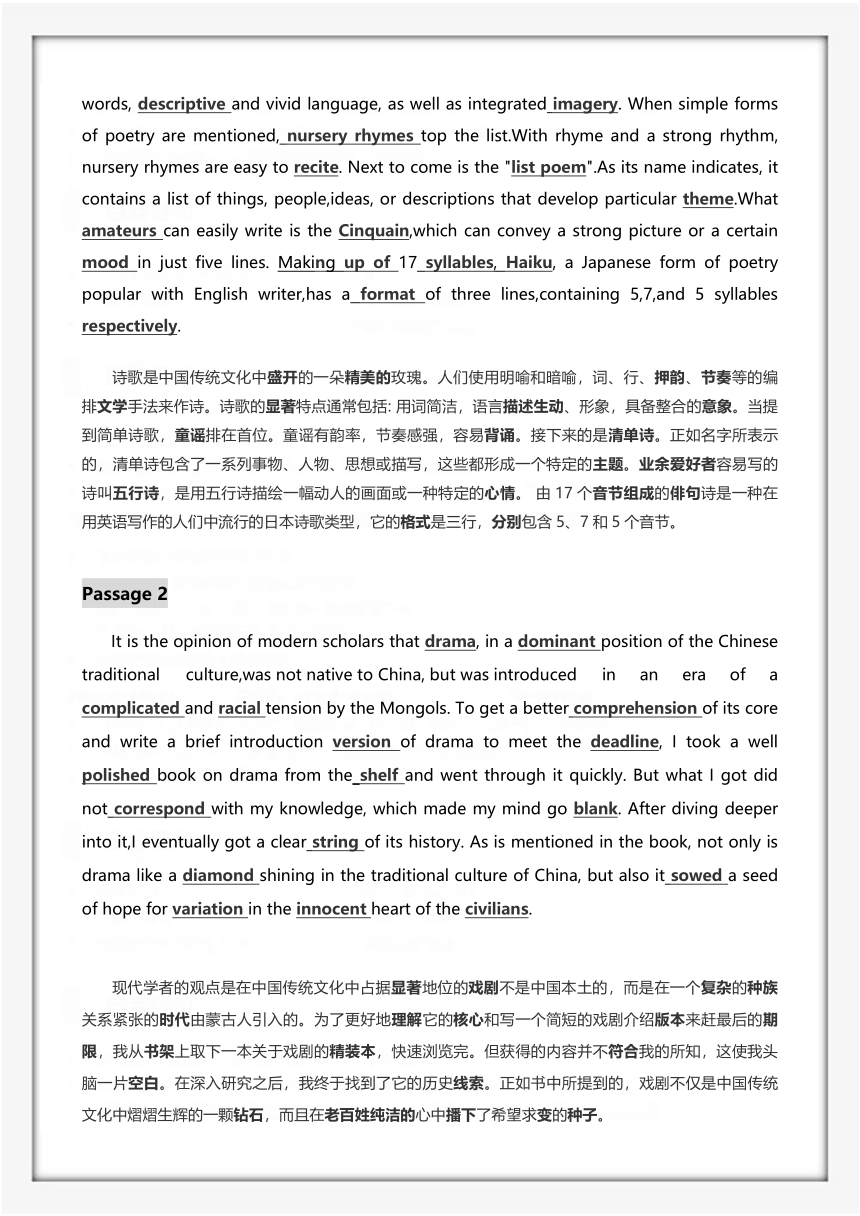
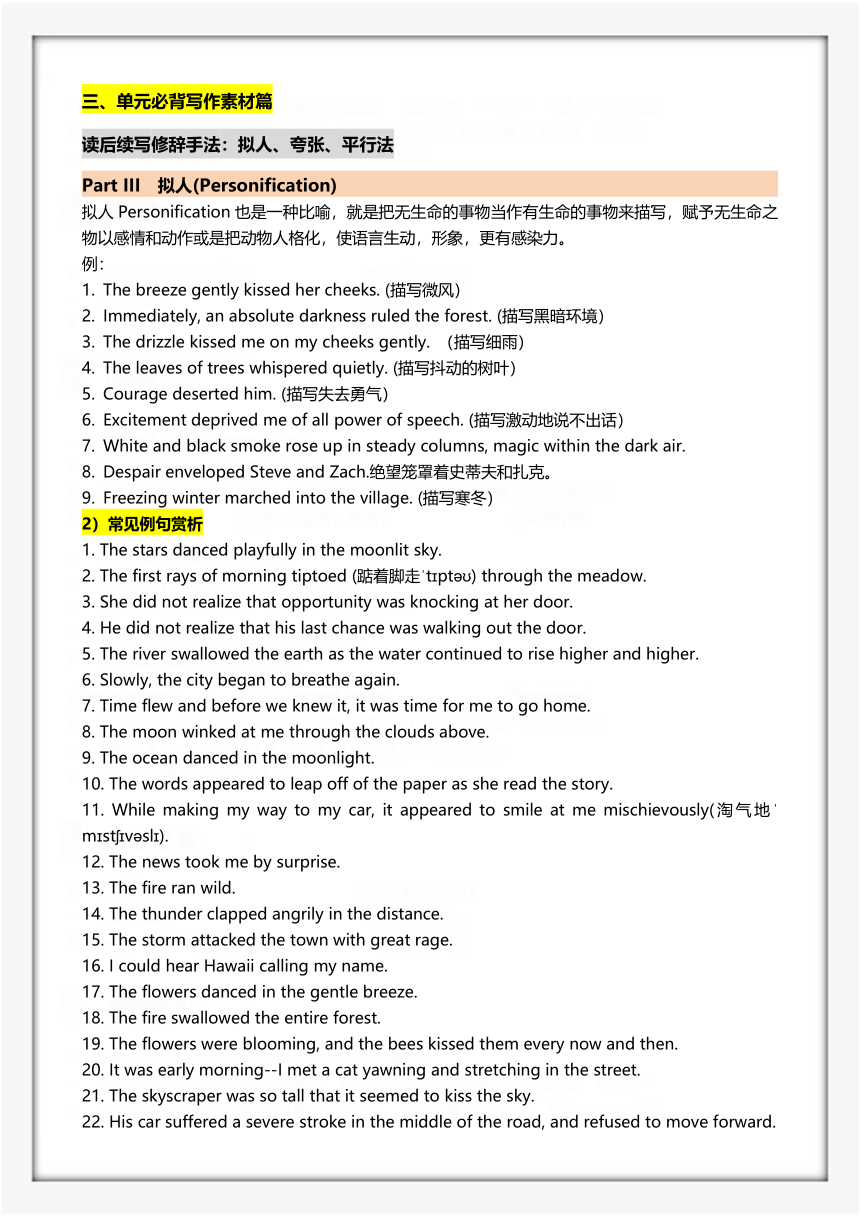
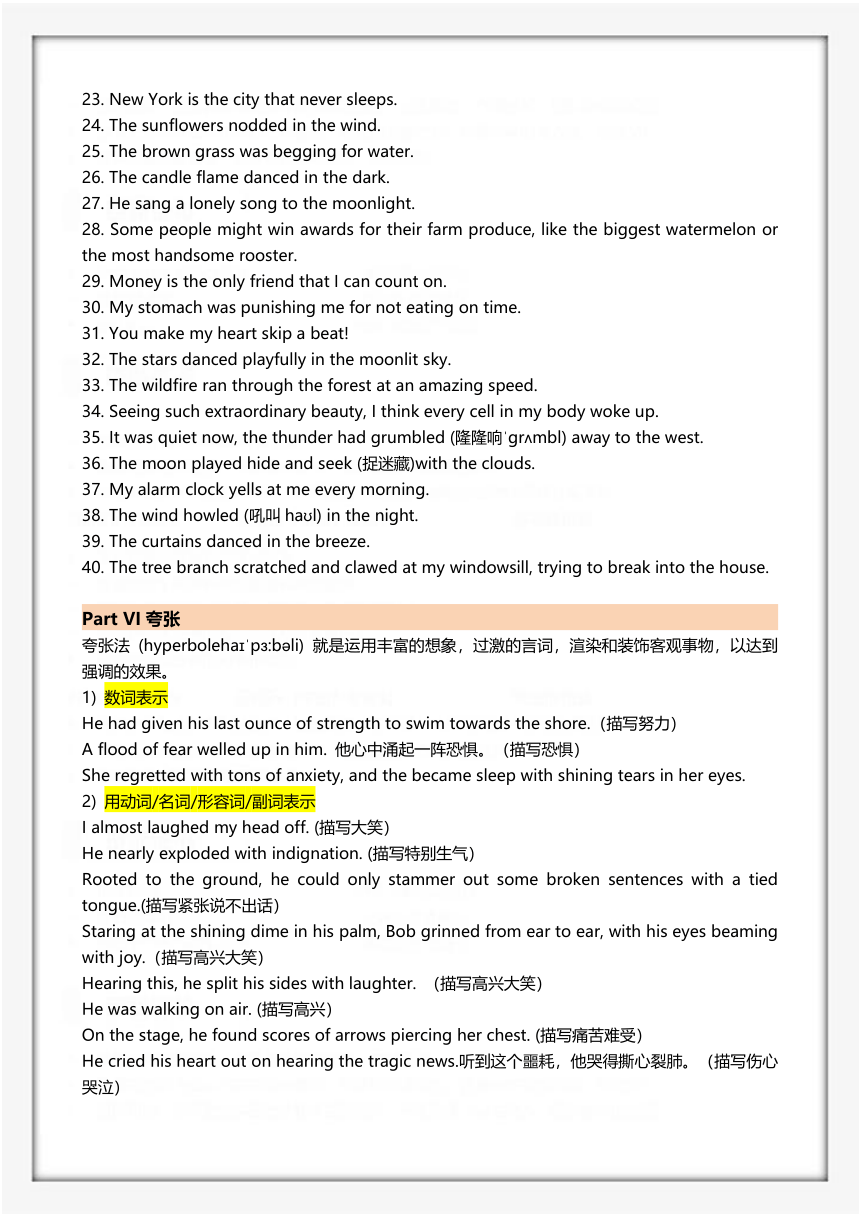
文档简介
一轮复习夯实基础必背知识清单
专题05.选择性必修第3册 Unit 5 Poems
一、单元必背词汇篇
重点词汇 阅读单词 1.rhythm n.节奏;韵律;规律 2.nursery adj.幼儿教育的 n.托儿所;保育室 3.mockingbird n.嘲鸫(美洲鸣禽,能模仿别种鸟的鸣叫) 4.brass n.黄铜;黄铜制品;铜管乐器 5.billy goat n.公山羊 6.bull n.公牛 7.bee n.蜜蜂 8.dewdrop n.露珠;水珠 9.dawn n.黎明;开端;萌芽 10.clover n.三叶草 11.butterfly n.蝴蝶 12.lawn n.草坪,草地 13.cinquain n.五行诗 14.tease vi.& vt.取笑(某人);揶揄;逗弄 15.haiku n.俳句 16.syllable n.音节 17.blossom n.花朵;花簇 18.await vt.等候;期待;将发生在 19.revolve vi.旋转;环绕;转动 20.utter vt.出声;说;讲 adj.完全的;十足的;彻底的 21.cherry n.樱桃;樱桃树;樱桃色 adj.樱桃色的;鲜红色的 22.cherry blossom樱花 23.verse n.诗;韵文;诗节 24.prose n.散文 25.dominant adj.首要的;占支配地位的;显著的 26.sonnet n.十四行诗 27.barren adj.贫瘠的;不结果实的 28.grief n.悲伤;悲痛;伤心事 29.Shakespeare莎士比亚(英国剧作家、诗人) 重点单词 1.rhyme n.押韵词;押韵的短诗vi.& vt.(使)押韵 2.folk adj.民间的;民俗的;普通百姓的 3.diamond n.钻石;金刚石;菱形 4.amateur n.业余爱好者 adj.业余的;业余爱好的 5.mood n.情绪;心情;语气 6.format n.格式;总体安排;(出版物的)版式 vt.格式化 7.delicate adj.精美的;精致的;脆弱的 8.comprehension n.理解力;领悟力;理解练习 9.shelf n.架子;搁板 10.core n.核心;精髓;(水果的)核儿 11.blank adj.空白的;无图画(或韵律、装饰)的;没表情的 n.空白;空格 12.civilian n.平民;老百姓 13.version n.版本;(从不同角度的)说法 14.era n.时代;年代;纪元 15.sow vt.& vi.播种;种 16.seed n.种子;起源;萌芽 17.deadline n.最后期限;截止日期 18.contest n.比赛;竞赛;竞争 vt.争取赢得(比赛、选举等);争辩 19.polish vt.修改;润色;抛光n.上光剂;抛光;擦亮 20.string n.细绳;线;一串 vt.悬挂;系 adj.弦乐器的;线织的 21.wherever conj.在任何地方;在所有……的情况下 adv.(用于问句)究竟在(到)哪里 22.complicated adj.复杂的;难懂的 23.prejudice n.偏见;成见 vt.使怀有(或形成)偏见
词汇拓展 1.drama n.戏;剧;戏剧艺术→dramatic adj.戏剧(性)的;突然的→dramatically adv.突然地;戏剧地;引人注目地 2.sorrow n.悲伤;悲痛;伤心事vi.感到悲伤→sorrowful adj.悲伤的;悲哀的 3.imagery n.形象的描述;意象;像→image n.形象;印象 4.literary adj.文学的;爱好文学的;有文学作品特征的→literature n.文学 5.recite vt.背诵;吟诵;列举→recitation n.背诵;逐一叙述 6.respectively adv.分别;各自;依次为→respective adj.分别的;各自的 7.sympathetic adj.同情的;有同情心的;赞同的→sympathy n.同情;赞同 8.innocence n.天真;单纯;无罪→innocent adj.天真无邪的;无辜的;无恶意的 9.correspondence n.来往信件;通信联系→correspond vi.相一致;符合;相当于;通信 10.variation n.变化;变体;变奏曲→vary vi.变化;不同→various adj.不同的;各种各样的→variety n.多样性;变化 11.racial adj.种族的;人种的→race n.竞赛;种族vi.& vt.(与……)赛跑;(与……)竞争
重点词组 1.nursery rhyme 童谣;儿歌 2.be made up of 由……组成(构成)
重点句型 1.There are various reasons why people compose poetry. 人们创作诗歌有各种各样的原因。 2.The reason is that they can feel the warmth of love and enjoy the innocence of childhood. 原因是他们能感觉到爱的温暖、享受童年的纯真。 3.Tagore was the first Asian to win the Nobel Prize in Literature. 泰戈尔是第一个获得诺贝尔文学奖的亚洲人。 4.Wherever it blew,I should know that the wind had been going there,too. 无论向哪里吹,我都知道风也曾去过那里。
单元必背文章篇
Passage 1
Poetry is a delicate rose in blossom in the Chinese traditional culture. People use literary devices like similes,metaphors, arrangement of words, lines, rhymes and rhythm to compose poetry, the distinctive characteristics of which include economical use of words, descriptive and vivid language, as well as integrated imagery. When simple forms of poetry are mentioned, nursery rhymes top the list.With rhyme and a strong rhythm, nursery rhymes are easy to recite. Next to come is the "list poem".As its name indicates, it contains a list of things, people,ideas, or descriptions that develop particular theme.What amateurs can easily write is the Cinquain,which can convey a strong picture or a certain mood in just five lines. Making up of 17 syllables, Haiku, a Japanese form of poetry popular with English writer,has a format of three lines,containing 5,7,and 5 syllables respectively.
诗歌是中国传统文化中盛开的一朵精美的玫瑰。人们使用明喻和暗喻,词、行、押韵、节奏等的编排文学手法来作诗。诗歌的显著特点通常包括: 用词简洁,语言描述生动、形象,具备整合的意象。当提到简单诗歌,童谣排在首位。童谣有韵率,节奏感强,容易背诵。接下来的是清单诗。正如名字所表示的,清单诗包含了一系列事物、人物、思想或描写,这些都形成一个特定的主题。业余爱好者容易写的诗叫五行诗,是用五行诗描绘一幅动人的画面或一种特定的心情。 由17个音节组成的俳句诗是一种在用英语写作的人们中流行的日本诗歌类型,它的格式是三行,分别包含5、7和5个音节。
Passage 2
It is the opinion of modern scholars that drama, in a dominant position of the Chinese traditional culture,was not native to China, but was introduced in an era of a complicated and racial tension by the Mongols. To get a better comprehension of its core and write a brief introduction version of drama to meet the deadline, I took a well polished book on drama from the_shelf and went through it quickly. But what I got did not correspond with my knowledge, which made my mind go blank. After diving deeper into it,I eventually got a clear string of its history. As is mentioned in the book, not only is drama like a diamond shining in the traditional culture of China, but also it sowed a seed of hope for variation in the innocent heart of the civilians.
现代学者的观点是在中国传统文化中占据显著地位的戏剧不是中国本土的,而是在一个复杂的种族关系紧张的时代由蒙古人引入的。为了更好地理解它的核心和写一个简短的戏剧介绍版本来赶最后的期限,我从书架上取下一本关于戏剧的精装本,快速浏览完。但获得的内容并不符合我的所知,这使我头脑一片空白。在深入研究之后,我终于找到了它的历史线索。正如书中所提到的,戏剧不仅是中国传统文化中熠熠生辉的一颗钻石,而且在老百姓纯洁的心中播下了希望求变的种子。
三、单元必背写作素材篇
读后续写修辞手法:拟人、夸张、平行法
Part III 拟人(Personification)
拟人Personification也是一种比喻,就是把无生命的事物当作有生命的事物来描写,赋予无生命之物以感情和动作或是把动物人格化,使语言生动,形象,更有感染力。
例:
The breeze gently kissed her cheeks. (描写微风)
Immediately, an absolute darkness ruled the forest. (描写黑暗环境)
The drizzle kissed me on my cheeks gently. (描写细雨)
The leaves of trees whispered quietly. (描写抖动的树叶)
Courage deserted him. (描写失去勇气)
Excitement deprived me of all power of speech. (描写激动地说不出话)
White and black smoke rose up in steady columns, magic within the dark air.
Despair enveloped Steve and Zach.绝望笼罩着史蒂夫和扎克。
Freezing winter marched into the village. (描写寒冬)
2)常见例句赏析
1. The stars danced playfully in the moonlit sky.
2. The first rays of morning tiptoed (踮着脚走 t pt ) through the meadow.
3. She did not realize that opportunity was knocking at her door.
4. He did not realize that his last chance was walking out the door.
5. The river swallowed the earth as the water continued to rise higher and higher.
6. Slowly, the city began to breathe again.
7. Time flew and before we knew it, it was time for me to go home.
8. The moon winked at me through the clouds above.
9. The ocean danced in the moonlight.
10. The words appeared to leap off of the paper as she read the story.
11. While making my way to my car, it appeared to smile at me mischievously(淘气地 m st v sl ).
12. The news took me by surprise.
13. The fire ran wild.
14. The thunder clapped angrily in the distance.
15. The storm attacked the town with great rage.
16. I could hear Hawaii calling my name.
17. The flowers danced in the gentle breeze.
18. The fire swallowed the entire forest.
19. The flowers were blooming, and the bees kissed them every now and then.
20. It was early morning--I met a cat yawning and stretching in the street.
21. The skyscraper was so tall that it seemed to kiss the sky.
22. His car suffered a severe stroke in the middle of the road, and refused to move forward.
23. New York is the city that never sleeps.
24. The sunflowers nodded in the wind.
25. The brown grass was begging for water.
26. The candle flame danced in the dark.
27. He sang a lonely song to the moonlight.
28. Some people might win awards for their farm produce, like the biggest watermelon or the most handsome rooster.
29. Money is the only friend that I can count on.
30. My stomach was punishing me for not eating on time.
31. You make my heart skip a beat!
32. The stars danced playfully in the moonlit sky.
33. The wildfire ran through the forest at an amazing speed.
34. Seeing such extraordinary beauty, I think every cell in my body woke up.
35. It was quiet now, the thunder had grumbled (隆隆响 gr mbl) away to the west.
36. The moon played hide and seek (捉迷藏)with the clouds.
37. My alarm clock yells at me every morning.
38. The wind howled (吼叫ha l) in the night.
39. The curtains danced in the breeze.
40. The tree branch scratched and clawed at my windowsill, trying to break into the house.
Part VI夸张
夸张法 (hyperboleha p :b li) 就是运用丰富的想象,过激的言词,渲染和装饰客观事物,以达到强调的效果。
数词表示
He had given his last ounce of strength to swim towards the shore.(描写努力)
A flood of fear welled up in him. 他心中涌起一阵恐惧。(描写恐惧)
She regretted with tons of anxiety, and the became sleep with shining tears in her eyes.
用动词/名词/形容词/副词表示
I almost laughed my head off. (描写大笑)
He nearly exploded with indignation. (描写特别生气)
Rooted to the ground, he could only stammer out some broken sentences with a tied tongue.(描写紧张说不出话)
Staring at the shining dime in his palm, Bob grinned from ear to ear, with his eyes beaming with joy.(描写高兴大笑)
Hearing this, he split his sides with laughter. (描写高兴大笑)
He was walking on air. (描写高兴)
On the stage, he found scores of arrows piercing her chest. (描写痛苦难受)
He cried his heart out on hearing the tragic news.听到这个噩耗,他哭得撕心裂肺。(描写伤心哭泣)
At the sight of the fierce wolf, I froze with terror, too scared to an inch.看到凶猛的狼,我吓得一愣一愣的,吓得寸步难行
I had butterflies in my stomach during the last minute of the basketball game.篮球比赛的最后一分钟,我紧张地不行。(描写紧张)
My heart pounded so hard that I thought my ribcage might explode.我的心扑通扑通跳得厉害,我觉得我的肋骨可能会爆炸。(描写紧张)
3)常见例句赏析
1. There's enough food in the cupboard to feed an entire army!
厨柜里有足够养活一支军队的食物。
2. I was walking along the road when suddenly this enormous dog stood in front of me. It was as big as an elephant.
我正沿着马路走着,这时一只大狗突然站在我前面。它有大象那么大。
3. My blood froze.
我的血液都凝固了。
4. I have wanted to kill myself a hundred times, but somehow I am still in love with life.
我曾上百次地想自杀,可是不知怎么的,我仍热爱生活。
5. Chris won't drive her home because she lives on the other side of the universe.
Chris不会开车送她回家,因为她坐在很远的地方。
6. When I told our father about this, his heart burst.
当我将这件事告诉我们的父亲时,他的心几乎要迸出来。
7. Basketball is the only thing that ever mattered to him.
足球是唯一对他重要的事。
8.They turned into an endless street
他们转入一条看不到尽头的街道。
9. My heart almost stopped beating when I heard my daughter's voice on the phone.
从电话里一听到我女儿的声音,我的心几乎停止跳动。
10. I was so hungry that I could eat a horse.
我很饿以致于可以吃掉一只马。
11. He was so sad that he wasdrowning in tears.
他如此伤心,泪流满面。
12. Old Mr. Johnson has been teaching here since the Stone Age.
老约翰逊先生自从石器时代就在这儿教书了。
13. It was so cold that…When the men spoke, their words froze in the air. Everything they said remained frozen all winter long, and did not melt until spring.
天是如此之冷,以致于男人们说话时,他们的话在空中冻结。他们说的一切在整个冬天都冻结着,直到春天才会融化。
14. I'm dying for a cup of tea.
我很想喝杯茶。
15. I could smell the fragrance of flowers from a mile away.
一里之外我就闻到花香。
16. When she heard the bad news, a river of tears poured out.
当她听到这个坏消息时,她泪流成河。
Part V平行法
平行法Parallelism一般由三项或三项以上的词语或句子构成,其并列的结构相同或类似,意义相关,语气连贯,使得句子流畅,富有节奏感。
1. You need to work quickly and decisively.
2. This is not only just what I wanted, but also just what I needed.
3. Mother was very busy gathering the laundry, dusting the furniture and washing the dishes.
4. How you live your life is more important than how many millions you have.
5. To survive you need: water, food and shelter.
6. Whether in class, at work, or at home, James was always busy.
7. Nancy read a book while Joe watched television.
8. They offer food, flowers and gifts to the dead.
9. For success in life, one needs to pursue his goal with determination and perseverance.
10. To succeed in life, you need to take advantage of opportunities and to follow your dreams.
11. Flying is fast, comfortable, and safe.
12. My face is washed, my hair is combed and my teeth are brushed.
13. You may respond by calling, visiting or e-mailing.
14. He likes television shows that have deep characters, interesting stories and good actors.
15. My fellow Americans, ask not what your country can do for you, ask what you can do for your country
16.The political leader said, "The present government has ruined the economy; it has ruined the education system; and it has ruined the health system of our country."
17. The president promised to reform health care, preserve social security, and a balanced budget.
18. I have to learn how to use the phone, how to pay bus fare, and how to ask a shopkeeper for things I didn't know the English for.
19. The movie was thrilling, exciting, and suspenseful (悬疑的s s'pensf l).
20. My parents did not approve of what I did nor what I said.
21. Olympic athletes usually like to practice, compete, and eat ice cream sandwiches.
22. What counts isn't how you look but how you behave.
四、单元必背语法篇
Grammar 定语从句
【观察例句】
1.Eric set sail once again,this time with 25 ships,of which only 14 made it to Greenland.
2.Eric reached Greenland and discovered that people could live in the place where he landed.
3.Biarni was the man with whom Leif discussed his plans.
4.By around 900AD,there were many places in Northern Europe where the Vikings chose to live.
【归纳用法】
一、限制性定语从句与非限制性定语从句概述
1.限制性定语从句是先行词不可缺少的一部分,若去掉,主句的内容就不完整,意义也会发生改变。从句和先行词的关系十分密切,从句紧跟先行词,两者之间不可用逗号隔开。
She has found the necklace (that) she lost two weeks ago.
她找到了那条两周前丢失的项链。
2.非限制性定语从句是对先行词的补充说明。没有它,主句也能独立存在;非限制性定语从句和先行词的关系不是很密切,两者之间用逗号隔开。
He has two sisters,who are working in the city.
他有两个姐姐,她们在城里工作。
[即学即练1] 单句语法填空
①The weather turned out to be very good, was more than we could expect.
②Is this the museum the exhibition was held
【答案】1.which 2.where
二、限制性定语从句和非限制性定语从句的区别
1.标点的运用有所不同
限制性定语从句一般紧跟在先行词后,其后不可用逗号分开;而非限制性定语从句也常放在先行词后,但必须用逗号与主句分开。
Who is the girl that is standing under the tree
站在树下的那个女孩是谁?
He is a teacher of much knowledge,from whom much can be learned.
他是一个学识渊博的老师,从他那儿可以学到许多东西。
2.从句的作用不同
限制性定语从句对先行词起到修饰限制作用,是先行词在意义上不可缺少的定语,一旦省略,主句的意思就不完整。而非限制性定语从句则是对一个概念清楚的先行词进行附加说明,若将其去掉,主句的意思仍然完整。
The next day,my brother and I went to the beach where we watched some people play volleyball.
第二天,我和弟弟去了海边。在那里,我们看到一些人在打沙滩排球。
Alice received a letter from her former classmate,which came as a surprise.
艾丽斯收到了她以前同学的一封信,这真是件令人惊奇的事情。
3.关系词的选用不同
限制性定语从句可以用关系代词who,whom,whose,that,which,关系副词when,where,why等引导,而非限制性定语从句不可用that或why来引导(上述引导词除了这两者以外均可用来引导非限制性定语从句)。
Yesterday he bought a new car,which was made in Japan.(which不可换用that)
昨天他买了一辆新车,是日本生产的。
He didn't give the reason,which explained his absence from the meeting held last week.(which不可换用why,因为which在定语从句中作主语,而why只能在定语从句中作状语)
=He didn't give the reason,for which he was absent from the meeting held last week.
他没有给出他上周没参加会议的理由。
4.从句所修饰的先行词有所不同
限制性定语从句的先行词通常是名词、代词或词组;而非限制性定语从句的先行词除了名词、代词外,还可以是句子。
This is the best book that I have ever read.
这是我曾经读过的书中的最好的一本。
He won the first prize in the contest,which was more than we expected.
他在比赛中得了一等奖,这一点真出乎我们预料。
5.关系词的省略不同
在限制性定语从句中,当关系代词在定语从句中作宾语或表语时,在口语中可以省略,关系副词有时也可省略。而非限制性定语从句中的关系代词或关系副词不可省略。
I still remember the days we spent together in college.(we前省略了that/which)
我仍然记得我们在大学时一起度过的日子。
She is not the one (that) she used to be.(that在定语从句中作表语)
她已不再是昔日的她了。
6.英译汉时有所不同,译成汉语时,往往把限制性定语从句的内容置于先行词之前;而非限制性定语从句和主句往往翻译成两个分句。
Which is the machine that we used last Sunday
上星期天我们用的那台机器是哪一台?
The concert,which was held last week,was a great success.
那场音乐会是上周举行的,获得了巨大的成功。
He may be late,in which case we ought to wait for him.
他可能迟到,要是那样的话我们就等等他。
[即学即练2] 单句语法填空
①Liquid water changes to vapor, is called evaporation.
②Charles Smith, was my former teacher,retired last year.
③This is the house I lived two years ago.
【答案】1.which 2.who 3.where
三、as和which引导非限制性定语从句的区别
which as
位置上 只能放在先行词的后面 位置灵活,可位于句前、句中,也可置于句后
搭配上 无动词的限制 谓语动词通常是表示感觉或心理活动的动词,如see,hear,know,expect,remember,guess,hope等
句意上 意为“这一点” 表示“正如……,正像……的那样”
The air quality in the city,as is shown in the report,has improved over the past two months.
正如报告所显示的,在过去的两个月里,这个城市的空气质量已有所改善。
After graduating from college,I took some time off to go travelling,which turned out to be a wise decision.
大学毕业后我抽出一部分时间去旅游,事实证明这是一个明智的选择。
[即学即练3]
①Metals have many good properties, has been stated before.
②Light travels in straight lines, explains why shadows are formed when it goes past an object.
【答案】1.as 2.which
Ⅰ.单句语法填空
1.The reason he explained for his being late was that his alarm clock didn't work.
2.Life is like a long race we compete with others to go beyond ourselves.
3.I often have the case I can't recognise my friend's voice on the phone.
4.Some pictures of the river brought the days back to the old they swam in it.
5.Many countries are now setting up national parks animals and plants can be protected.
6.Mexico City, has a population of over 10 million,is probably the fastest growing city in the world.
7.We will be shown around the city: schools,museums,and some other places, other visitors seldom go.
8. is known to everybody,the moon travels round the earth once every month.
9.English is a language shared by several diverse cultures,each of uses it differently.
10.I wish to thank Professor Smith,without help I would never have got this far.
【答案】1.which/that2.where 3.where 4.when 5.where 6.which 7.where 8.As 9.which 10.whose
专题05.选择性必修第3册 Unit 5 Poems
一、单元必背词汇篇
重点词汇 阅读单词 1.rhythm n.节奏;韵律;规律 2.nursery adj.幼儿教育的 n.托儿所;保育室 3.mockingbird n.嘲鸫(美洲鸣禽,能模仿别种鸟的鸣叫) 4.brass n.黄铜;黄铜制品;铜管乐器 5.billy goat n.公山羊 6.bull n.公牛 7.bee n.蜜蜂 8.dewdrop n.露珠;水珠 9.dawn n.黎明;开端;萌芽 10.clover n.三叶草 11.butterfly n.蝴蝶 12.lawn n.草坪,草地 13.cinquain n.五行诗 14.tease vi.& vt.取笑(某人);揶揄;逗弄 15.haiku n.俳句 16.syllable n.音节 17.blossom n.花朵;花簇 18.await vt.等候;期待;将发生在 19.revolve vi.旋转;环绕;转动 20.utter vt.出声;说;讲 adj.完全的;十足的;彻底的 21.cherry n.樱桃;樱桃树;樱桃色 adj.樱桃色的;鲜红色的 22.cherry blossom樱花 23.verse n.诗;韵文;诗节 24.prose n.散文 25.dominant adj.首要的;占支配地位的;显著的 26.sonnet n.十四行诗 27.barren adj.贫瘠的;不结果实的 28.grief n.悲伤;悲痛;伤心事 29.Shakespeare莎士比亚(英国剧作家、诗人) 重点单词 1.rhyme n.押韵词;押韵的短诗vi.& vt.(使)押韵 2.folk adj.民间的;民俗的;普通百姓的 3.diamond n.钻石;金刚石;菱形 4.amateur n.业余爱好者 adj.业余的;业余爱好的 5.mood n.情绪;心情;语气 6.format n.格式;总体安排;(出版物的)版式 vt.格式化 7.delicate adj.精美的;精致的;脆弱的 8.comprehension n.理解力;领悟力;理解练习 9.shelf n.架子;搁板 10.core n.核心;精髓;(水果的)核儿 11.blank adj.空白的;无图画(或韵律、装饰)的;没表情的 n.空白;空格 12.civilian n.平民;老百姓 13.version n.版本;(从不同角度的)说法 14.era n.时代;年代;纪元 15.sow vt.& vi.播种;种 16.seed n.种子;起源;萌芽 17.deadline n.最后期限;截止日期 18.contest n.比赛;竞赛;竞争 vt.争取赢得(比赛、选举等);争辩 19.polish vt.修改;润色;抛光n.上光剂;抛光;擦亮 20.string n.细绳;线;一串 vt.悬挂;系 adj.弦乐器的;线织的 21.wherever conj.在任何地方;在所有……的情况下 adv.(用于问句)究竟在(到)哪里 22.complicated adj.复杂的;难懂的 23.prejudice n.偏见;成见 vt.使怀有(或形成)偏见
词汇拓展 1.drama n.戏;剧;戏剧艺术→dramatic adj.戏剧(性)的;突然的→dramatically adv.突然地;戏剧地;引人注目地 2.sorrow n.悲伤;悲痛;伤心事vi.感到悲伤→sorrowful adj.悲伤的;悲哀的 3.imagery n.形象的描述;意象;像→image n.形象;印象 4.literary adj.文学的;爱好文学的;有文学作品特征的→literature n.文学 5.recite vt.背诵;吟诵;列举→recitation n.背诵;逐一叙述 6.respectively adv.分别;各自;依次为→respective adj.分别的;各自的 7.sympathetic adj.同情的;有同情心的;赞同的→sympathy n.同情;赞同 8.innocence n.天真;单纯;无罪→innocent adj.天真无邪的;无辜的;无恶意的 9.correspondence n.来往信件;通信联系→correspond vi.相一致;符合;相当于;通信 10.variation n.变化;变体;变奏曲→vary vi.变化;不同→various adj.不同的;各种各样的→variety n.多样性;变化 11.racial adj.种族的;人种的→race n.竞赛;种族vi.& vt.(与……)赛跑;(与……)竞争
重点词组 1.nursery rhyme 童谣;儿歌 2.be made up of 由……组成(构成)
重点句型 1.There are various reasons why people compose poetry. 人们创作诗歌有各种各样的原因。 2.The reason is that they can feel the warmth of love and enjoy the innocence of childhood. 原因是他们能感觉到爱的温暖、享受童年的纯真。 3.Tagore was the first Asian to win the Nobel Prize in Literature. 泰戈尔是第一个获得诺贝尔文学奖的亚洲人。 4.Wherever it blew,I should know that the wind had been going there,too. 无论向哪里吹,我都知道风也曾去过那里。
单元必背文章篇
Passage 1
Poetry is a delicate rose in blossom in the Chinese traditional culture. People use literary devices like similes,metaphors, arrangement of words, lines, rhymes and rhythm to compose poetry, the distinctive characteristics of which include economical use of words, descriptive and vivid language, as well as integrated imagery. When simple forms of poetry are mentioned, nursery rhymes top the list.With rhyme and a strong rhythm, nursery rhymes are easy to recite. Next to come is the "list poem".As its name indicates, it contains a list of things, people,ideas, or descriptions that develop particular theme.What amateurs can easily write is the Cinquain,which can convey a strong picture or a certain mood in just five lines. Making up of 17 syllables, Haiku, a Japanese form of poetry popular with English writer,has a format of three lines,containing 5,7,and 5 syllables respectively.
诗歌是中国传统文化中盛开的一朵精美的玫瑰。人们使用明喻和暗喻,词、行、押韵、节奏等的编排文学手法来作诗。诗歌的显著特点通常包括: 用词简洁,语言描述生动、形象,具备整合的意象。当提到简单诗歌,童谣排在首位。童谣有韵率,节奏感强,容易背诵。接下来的是清单诗。正如名字所表示的,清单诗包含了一系列事物、人物、思想或描写,这些都形成一个特定的主题。业余爱好者容易写的诗叫五行诗,是用五行诗描绘一幅动人的画面或一种特定的心情。 由17个音节组成的俳句诗是一种在用英语写作的人们中流行的日本诗歌类型,它的格式是三行,分别包含5、7和5个音节。
Passage 2
It is the opinion of modern scholars that drama, in a dominant position of the Chinese traditional culture,was not native to China, but was introduced in an era of a complicated and racial tension by the Mongols. To get a better comprehension of its core and write a brief introduction version of drama to meet the deadline, I took a well polished book on drama from the_shelf and went through it quickly. But what I got did not correspond with my knowledge, which made my mind go blank. After diving deeper into it,I eventually got a clear string of its history. As is mentioned in the book, not only is drama like a diamond shining in the traditional culture of China, but also it sowed a seed of hope for variation in the innocent heart of the civilians.
现代学者的观点是在中国传统文化中占据显著地位的戏剧不是中国本土的,而是在一个复杂的种族关系紧张的时代由蒙古人引入的。为了更好地理解它的核心和写一个简短的戏剧介绍版本来赶最后的期限,我从书架上取下一本关于戏剧的精装本,快速浏览完。但获得的内容并不符合我的所知,这使我头脑一片空白。在深入研究之后,我终于找到了它的历史线索。正如书中所提到的,戏剧不仅是中国传统文化中熠熠生辉的一颗钻石,而且在老百姓纯洁的心中播下了希望求变的种子。
三、单元必背写作素材篇
读后续写修辞手法:拟人、夸张、平行法
Part III 拟人(Personification)
拟人Personification也是一种比喻,就是把无生命的事物当作有生命的事物来描写,赋予无生命之物以感情和动作或是把动物人格化,使语言生动,形象,更有感染力。
例:
The breeze gently kissed her cheeks. (描写微风)
Immediately, an absolute darkness ruled the forest. (描写黑暗环境)
The drizzle kissed me on my cheeks gently. (描写细雨)
The leaves of trees whispered quietly. (描写抖动的树叶)
Courage deserted him. (描写失去勇气)
Excitement deprived me of all power of speech. (描写激动地说不出话)
White and black smoke rose up in steady columns, magic within the dark air.
Despair enveloped Steve and Zach.绝望笼罩着史蒂夫和扎克。
Freezing winter marched into the village. (描写寒冬)
2)常见例句赏析
1. The stars danced playfully in the moonlit sky.
2. The first rays of morning tiptoed (踮着脚走 t pt ) through the meadow.
3. She did not realize that opportunity was knocking at her door.
4. He did not realize that his last chance was walking out the door.
5. The river swallowed the earth as the water continued to rise higher and higher.
6. Slowly, the city began to breathe again.
7. Time flew and before we knew it, it was time for me to go home.
8. The moon winked at me through the clouds above.
9. The ocean danced in the moonlight.
10. The words appeared to leap off of the paper as she read the story.
11. While making my way to my car, it appeared to smile at me mischievously(淘气地 m st v sl ).
12. The news took me by surprise.
13. The fire ran wild.
14. The thunder clapped angrily in the distance.
15. The storm attacked the town with great rage.
16. I could hear Hawaii calling my name.
17. The flowers danced in the gentle breeze.
18. The fire swallowed the entire forest.
19. The flowers were blooming, and the bees kissed them every now and then.
20. It was early morning--I met a cat yawning and stretching in the street.
21. The skyscraper was so tall that it seemed to kiss the sky.
22. His car suffered a severe stroke in the middle of the road, and refused to move forward.
23. New York is the city that never sleeps.
24. The sunflowers nodded in the wind.
25. The brown grass was begging for water.
26. The candle flame danced in the dark.
27. He sang a lonely song to the moonlight.
28. Some people might win awards for their farm produce, like the biggest watermelon or the most handsome rooster.
29. Money is the only friend that I can count on.
30. My stomach was punishing me for not eating on time.
31. You make my heart skip a beat!
32. The stars danced playfully in the moonlit sky.
33. The wildfire ran through the forest at an amazing speed.
34. Seeing such extraordinary beauty, I think every cell in my body woke up.
35. It was quiet now, the thunder had grumbled (隆隆响 gr mbl) away to the west.
36. The moon played hide and seek (捉迷藏)with the clouds.
37. My alarm clock yells at me every morning.
38. The wind howled (吼叫ha l) in the night.
39. The curtains danced in the breeze.
40. The tree branch scratched and clawed at my windowsill, trying to break into the house.
Part VI夸张
夸张法 (hyperboleha p :b li) 就是运用丰富的想象,过激的言词,渲染和装饰客观事物,以达到强调的效果。
数词表示
He had given his last ounce of strength to swim towards the shore.(描写努力)
A flood of fear welled up in him. 他心中涌起一阵恐惧。(描写恐惧)
She regretted with tons of anxiety, and the became sleep with shining tears in her eyes.
用动词/名词/形容词/副词表示
I almost laughed my head off. (描写大笑)
He nearly exploded with indignation. (描写特别生气)
Rooted to the ground, he could only stammer out some broken sentences with a tied tongue.(描写紧张说不出话)
Staring at the shining dime in his palm, Bob grinned from ear to ear, with his eyes beaming with joy.(描写高兴大笑)
Hearing this, he split his sides with laughter. (描写高兴大笑)
He was walking on air. (描写高兴)
On the stage, he found scores of arrows piercing her chest. (描写痛苦难受)
He cried his heart out on hearing the tragic news.听到这个噩耗,他哭得撕心裂肺。(描写伤心哭泣)
At the sight of the fierce wolf, I froze with terror, too scared to an inch.看到凶猛的狼,我吓得一愣一愣的,吓得寸步难行
I had butterflies in my stomach during the last minute of the basketball game.篮球比赛的最后一分钟,我紧张地不行。(描写紧张)
My heart pounded so hard that I thought my ribcage might explode.我的心扑通扑通跳得厉害,我觉得我的肋骨可能会爆炸。(描写紧张)
3)常见例句赏析
1. There's enough food in the cupboard to feed an entire army!
厨柜里有足够养活一支军队的食物。
2. I was walking along the road when suddenly this enormous dog stood in front of me. It was as big as an elephant.
我正沿着马路走着,这时一只大狗突然站在我前面。它有大象那么大。
3. My blood froze.
我的血液都凝固了。
4. I have wanted to kill myself a hundred times, but somehow I am still in love with life.
我曾上百次地想自杀,可是不知怎么的,我仍热爱生活。
5. Chris won't drive her home because she lives on the other side of the universe.
Chris不会开车送她回家,因为她坐在很远的地方。
6. When I told our father about this, his heart burst.
当我将这件事告诉我们的父亲时,他的心几乎要迸出来。
7. Basketball is the only thing that ever mattered to him.
足球是唯一对他重要的事。
8.They turned into an endless street
他们转入一条看不到尽头的街道。
9. My heart almost stopped beating when I heard my daughter's voice on the phone.
从电话里一听到我女儿的声音,我的心几乎停止跳动。
10. I was so hungry that I could eat a horse.
我很饿以致于可以吃掉一只马。
11. He was so sad that he wasdrowning in tears.
他如此伤心,泪流满面。
12. Old Mr. Johnson has been teaching here since the Stone Age.
老约翰逊先生自从石器时代就在这儿教书了。
13. It was so cold that…When the men spoke, their words froze in the air. Everything they said remained frozen all winter long, and did not melt until spring.
天是如此之冷,以致于男人们说话时,他们的话在空中冻结。他们说的一切在整个冬天都冻结着,直到春天才会融化。
14. I'm dying for a cup of tea.
我很想喝杯茶。
15. I could smell the fragrance of flowers from a mile away.
一里之外我就闻到花香。
16. When she heard the bad news, a river of tears poured out.
当她听到这个坏消息时,她泪流成河。
Part V平行法
平行法Parallelism一般由三项或三项以上的词语或句子构成,其并列的结构相同或类似,意义相关,语气连贯,使得句子流畅,富有节奏感。
1. You need to work quickly and decisively.
2. This is not only just what I wanted, but also just what I needed.
3. Mother was very busy gathering the laundry, dusting the furniture and washing the dishes.
4. How you live your life is more important than how many millions you have.
5. To survive you need: water, food and shelter.
6. Whether in class, at work, or at home, James was always busy.
7. Nancy read a book while Joe watched television.
8. They offer food, flowers and gifts to the dead.
9. For success in life, one needs to pursue his goal with determination and perseverance.
10. To succeed in life, you need to take advantage of opportunities and to follow your dreams.
11. Flying is fast, comfortable, and safe.
12. My face is washed, my hair is combed and my teeth are brushed.
13. You may respond by calling, visiting or e-mailing.
14. He likes television shows that have deep characters, interesting stories and good actors.
15. My fellow Americans, ask not what your country can do for you, ask what you can do for your country
16.The political leader said, "The present government has ruined the economy; it has ruined the education system; and it has ruined the health system of our country."
17. The president promised to reform health care, preserve social security, and a balanced budget.
18. I have to learn how to use the phone, how to pay bus fare, and how to ask a shopkeeper for things I didn't know the English for.
19. The movie was thrilling, exciting, and suspenseful (悬疑的s s'pensf l).
20. My parents did not approve of what I did nor what I said.
21. Olympic athletes usually like to practice, compete, and eat ice cream sandwiches.
22. What counts isn't how you look but how you behave.
四、单元必背语法篇
Grammar 定语从句
【观察例句】
1.Eric set sail once again,this time with 25 ships,of which only 14 made it to Greenland.
2.Eric reached Greenland and discovered that people could live in the place where he landed.
3.Biarni was the man with whom Leif discussed his plans.
4.By around 900AD,there were many places in Northern Europe where the Vikings chose to live.
【归纳用法】
一、限制性定语从句与非限制性定语从句概述
1.限制性定语从句是先行词不可缺少的一部分,若去掉,主句的内容就不完整,意义也会发生改变。从句和先行词的关系十分密切,从句紧跟先行词,两者之间不可用逗号隔开。
She has found the necklace (that) she lost two weeks ago.
她找到了那条两周前丢失的项链。
2.非限制性定语从句是对先行词的补充说明。没有它,主句也能独立存在;非限制性定语从句和先行词的关系不是很密切,两者之间用逗号隔开。
He has two sisters,who are working in the city.
他有两个姐姐,她们在城里工作。
[即学即练1] 单句语法填空
①The weather turned out to be very good, was more than we could expect.
②Is this the museum the exhibition was held
【答案】1.which 2.where
二、限制性定语从句和非限制性定语从句的区别
1.标点的运用有所不同
限制性定语从句一般紧跟在先行词后,其后不可用逗号分开;而非限制性定语从句也常放在先行词后,但必须用逗号与主句分开。
Who is the girl that is standing under the tree
站在树下的那个女孩是谁?
He is a teacher of much knowledge,from whom much can be learned.
他是一个学识渊博的老师,从他那儿可以学到许多东西。
2.从句的作用不同
限制性定语从句对先行词起到修饰限制作用,是先行词在意义上不可缺少的定语,一旦省略,主句的意思就不完整。而非限制性定语从句则是对一个概念清楚的先行词进行附加说明,若将其去掉,主句的意思仍然完整。
The next day,my brother and I went to the beach where we watched some people play volleyball.
第二天,我和弟弟去了海边。在那里,我们看到一些人在打沙滩排球。
Alice received a letter from her former classmate,which came as a surprise.
艾丽斯收到了她以前同学的一封信,这真是件令人惊奇的事情。
3.关系词的选用不同
限制性定语从句可以用关系代词who,whom,whose,that,which,关系副词when,where,why等引导,而非限制性定语从句不可用that或why来引导(上述引导词除了这两者以外均可用来引导非限制性定语从句)。
Yesterday he bought a new car,which was made in Japan.(which不可换用that)
昨天他买了一辆新车,是日本生产的。
He didn't give the reason,which explained his absence from the meeting held last week.(which不可换用why,因为which在定语从句中作主语,而why只能在定语从句中作状语)
=He didn't give the reason,for which he was absent from the meeting held last week.
他没有给出他上周没参加会议的理由。
4.从句所修饰的先行词有所不同
限制性定语从句的先行词通常是名词、代词或词组;而非限制性定语从句的先行词除了名词、代词外,还可以是句子。
This is the best book that I have ever read.
这是我曾经读过的书中的最好的一本。
He won the first prize in the contest,which was more than we expected.
他在比赛中得了一等奖,这一点真出乎我们预料。
5.关系词的省略不同
在限制性定语从句中,当关系代词在定语从句中作宾语或表语时,在口语中可以省略,关系副词有时也可省略。而非限制性定语从句中的关系代词或关系副词不可省略。
I still remember the days we spent together in college.(we前省略了that/which)
我仍然记得我们在大学时一起度过的日子。
She is not the one (that) she used to be.(that在定语从句中作表语)
她已不再是昔日的她了。
6.英译汉时有所不同,译成汉语时,往往把限制性定语从句的内容置于先行词之前;而非限制性定语从句和主句往往翻译成两个分句。
Which is the machine that we used last Sunday
上星期天我们用的那台机器是哪一台?
The concert,which was held last week,was a great success.
那场音乐会是上周举行的,获得了巨大的成功。
He may be late,in which case we ought to wait for him.
他可能迟到,要是那样的话我们就等等他。
[即学即练2] 单句语法填空
①Liquid water changes to vapor, is called evaporation.
②Charles Smith, was my former teacher,retired last year.
③This is the house I lived two years ago.
【答案】1.which 2.who 3.where
三、as和which引导非限制性定语从句的区别
which as
位置上 只能放在先行词的后面 位置灵活,可位于句前、句中,也可置于句后
搭配上 无动词的限制 谓语动词通常是表示感觉或心理活动的动词,如see,hear,know,expect,remember,guess,hope等
句意上 意为“这一点” 表示“正如……,正像……的那样”
The air quality in the city,as is shown in the report,has improved over the past two months.
正如报告所显示的,在过去的两个月里,这个城市的空气质量已有所改善。
After graduating from college,I took some time off to go travelling,which turned out to be a wise decision.
大学毕业后我抽出一部分时间去旅游,事实证明这是一个明智的选择。
[即学即练3]
①Metals have many good properties, has been stated before.
②Light travels in straight lines, explains why shadows are formed when it goes past an object.
【答案】1.as 2.which
Ⅰ.单句语法填空
1.The reason he explained for his being late was that his alarm clock didn't work.
2.Life is like a long race we compete with others to go beyond ourselves.
3.I often have the case I can't recognise my friend's voice on the phone.
4.Some pictures of the river brought the days back to the old they swam in it.
5.Many countries are now setting up national parks animals and plants can be protected.
6.Mexico City, has a population of over 10 million,is probably the fastest growing city in the world.
7.We will be shown around the city: schools,museums,and some other places, other visitors seldom go.
8. is known to everybody,the moon travels round the earth once every month.
9.English is a language shared by several diverse cultures,each of uses it differently.
10.I wish to thank Professor Smith,without help I would never have got this far.
【答案】1.which/that2.where 3.where 4.when 5.where 6.which 7.where 8.As 9.which 10.whose
